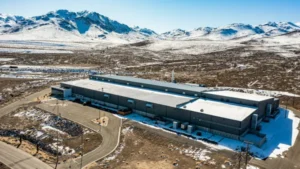Supply Chain & Logistics News Round-Up Sept 23rd- 27th
 This week I was busy attending various Climate Week NYC events, allowing me to step outside my usual bubble of supply chain and sustainability. I attended multiple events focused on the built environment, embodied carbon, digital decarbonization tools, and storytelling. I now better understand the weight of our decisions today and the impacts they carry into the future. NYC Climate Week is a great opportunity to learn and connect but now the real work begins! I look forward to continuing to cover the latest and emerging stories in the supply chain and sustainability space.
This week I was busy attending various Climate Week NYC events, allowing me to step outside my usual bubble of supply chain and sustainability. I attended multiple events focused on the built environment, embodied carbon, digital decarbonization tools, and storytelling. I now better understand the weight of our decisions today and the impacts they carry into the future. NYC Climate Week is a great opportunity to learn and connect but now the real work begins! I look forward to continuing to cover the latest and emerging stories in the supply chain and sustainability space.
Now to the Supply Chain & Logistics News of the Week!
American Battery Technology Company Receives $150 Million in Grant Funding


The American Battery Technology Company was selected for the highly competitive $150 million federal grant from the U.S. Department of Energy. ABTC is building a new lithium-ion battery recycling facility that will process 100,000 tonnes of materials annually, supporting a sustainable battery supply chain in North America. By collaborating with partners like BASF, Siemens, and Clemson University, the company aims to advance battery recycling technologies with reduced environmental impact. The project will create jobs, promote community engagement, and develop a domestic workforce in battery recycling, particularly benefiting underserved communities. This initiative is part of ABTC’s broader effort to strengthen the circular supply chain for battery metals. This is the fifth grant the ABTC has received from the US Department of Energy totaling in over 200 million US dollars.
2024 Typhoon Season has Caused Billions in Agricultural Losses


This year’s typhoon season has been particularly disruptive, severely affecting port operations and shipping across the western Pacific, with significant storms such as Gaemi, Ampil, Shanshan, Yagi, and Bebinka impacting Taiwan, China, Japan, Vietnam, and the Philippines. The storms have delayed freight, increased congestion, and damaged crops, especially in Taiwan, where Typhoon Gaemi caused over $86 million in losses. According to the U.S. Department of Agriculture, Taiwan’s loss of crops from Typhoon Gaemi was an estimated $58.3 million. With the addition of livestock and fish production, the estimated loss exceeds $86 million. The affected area spans 23,060 hectares, with a damage severity of 27%, translating to 6,305 unharvestable hectares. Typhoons also disrupt industrial production, transport, and supply chains, with severe flooding and damage to road and rail networks. Experts stress the need for resilient supply chains and efficient decision-making to mitigate the risks, as stronger storms are expected due to climate change.
Alaskan Airlines Adapts its Cargo Division Following Its Recent Acquisition


Alaska Airlines has announced key leadership changes in its cargo division following the acquisition of Hawaiian Airlines, positioning itself for growth in international cargo operations and expanded services for Amazon. Ian Morgan, with extensive experience from Qatar Airways and Cargolux, will oversee day-to-day cargo operations and lead a team of 600 employees. Jason Berry, now executive vice president of Alaska Air Group, will supervise both Alaska and Hawaiian Airlines’ cargo operations, enhancing synergies between the two brands. The integration, which involves operating under a single certificate while maintaining separate brands, will gradually roll out, enabling Alaska to expand into new markets and leverage Hawaiian’s long-range aircraft capabilities to support its growing cargo network.
Pennsylvania Governor Urges for Faster Approvement Process for Three Mile Island Nuclear Plant PPA with Microsoft


Constellation Energy signed a 20-year power purchase agreement (PPA) with Microsoft to help the restart of a unit of the Three Mile Island Nuclear Plant, located in Pennsylvania, US. Within the last agreement, Microsoft will purchase energy from Three Mile Island to power its data centers that are located within the state. Pennsylvania Governor Josh Shapiro is urging PJM Interconnection to speed up its process for reviewing interconnection requests for ready-to-go projects like Constellation Energy’s 835-MW unit at the Three Mile Island nuclear plant, now named the Crane Clean Energy Center. Shapiro emphasizes the need to prioritize these projects, given the lengthy approval process for new developments. The project could be expedited if PJM adopts faster review methods for such projects. PJM is exploring ways to fast-track shovel-ready projects, which could improve system reliability. Analysts predict the deal will be financially favorable for Constellation and could lead to more partnerships with data centers and nuclear facilities.
Schneider Electric Launches Solution Aimed at Decarbonizing Buildings


Schneider Electric has launched an online regulatory compliance tool called the Building Decarbonization Calculator (BDC) to assist building owners and operators in calculating their carbon emissions and energy use intensity. This tool leverages a dataset of nearly 500,000 building performance models across various types, sizes, and climate zones. The BDC enables users to identify energy and carbon conservation measures, evaluate the carbon and financial return on investment, and compare their decarbonization efforts with targets set by New York City’s Local Law 97 and the Carbon Risk Real Estate Monitor. It aims to help building owners avoid penalties for noncompliance with local regulations. Currently equipped to assist with LL97 compliance, Schneider Electric plans to incorporate Boston’s building performance standards by mid-2025.
Song of the week:





















